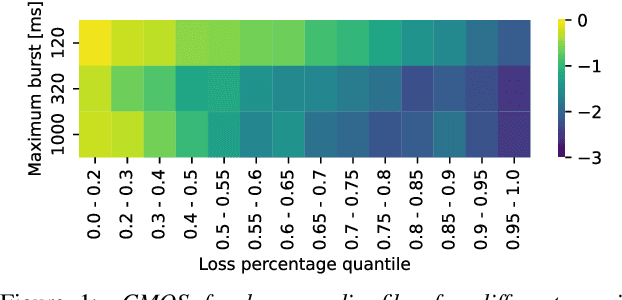Lorenz Diener
The ICASSP 2024 Audio Deep Packet Loss Concealment Challenge
Feb 26, 2024
Abstract:Audio packet loss concealment is the hiding of gaps in VoIP audio streams caused by network packet loss. With the ICASSP 2024 Audio Deep Packet Loss Concealment Grand Challenge, we build on the success of the previous Audio PLC Challenge held at INTERSPEECH 2022. We evaluate models on an overall harder dataset, and use the new ITU-T P.804 evaluation procedure to more closely evaluate the performance of systems specifically on the PLC task. We evaluate a total of 9 systems, 8 of which satisfy the strict real-time performance requirements of the challenge, using both P.804 and Word Accuracy evaluations.
PLCMOS -- a data-driven non-intrusive metric for the evaluation of packet loss concealment algorithms
May 24, 2023Abstract:Speech quality assessment is a problem for every researcher working on models that produce or process speech. Human subjective ratings, the gold standard in speech quality assessment, are expensive and time-consuming to acquire in a quantity that is sufficient to get reliable data, while automated objective metrics show a low correlation with gold standard ratings. This paper presents PLCMOS, a non-intrusive data-driven tool for generating a robust, accurate estimate of the mean opinion score a human rater would assign an audio file that has been processed by being transmitted over a degraded packet-switched network with missing packets being healed by a packet loss concealment algorithm. Our new model shows a model-wise Pearson's correlation of ~0.97 and rank correlation of ~0.95 with human ratings, substantially above all other available intrusive and non-intrusive metrics. The model is released as an ONNX model for other researchers to use when building PLC systems.
INTERSPEECH 2022 Audio Deep Packet Loss Concealment Challenge
Apr 11, 2022


Abstract:Audio Packet Loss Concealment (PLC) is the hiding of gaps in audio streams caused by data transmission failures in packet switched networks. This is a common problem, and of increasing importance as end-to-end VoIP telephony and teleconference systems become the default and ever more widely used form of communication in business as well as in personal usage. This paper presents the INTERSPEECH 2022 Audio Deep Packet Loss Concealment challenge. We first give an overview of the PLC problem, and introduce some classical approaches to PLC as well as recent work. We then present the open source dataset released as part of this challenge as well as the evaluation methods and metrics used to determine the winner. We also briefly introduce PLCMOS, a novel data-driven metric that can be used to quickly evaluate the performance PLC systems. Finally, we present the results of the INTERSPEECH 2022 Audio Deep PLC Challenge, and provide a summary of important takeaways.
 Add to Chrome
Add to Chrome Add to Firefox
Add to Firefox Add to Edge
Add to Edge